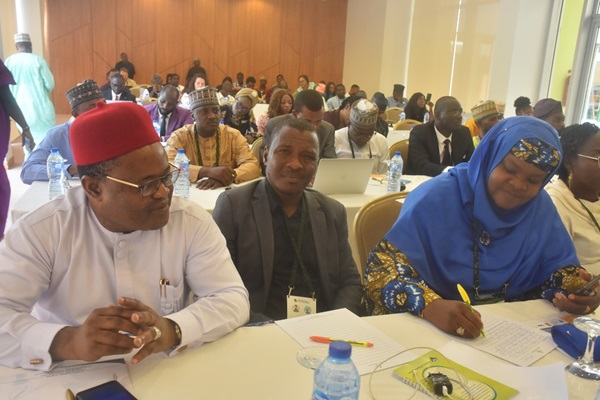
The chairman of the House of Representatives Committee on Climate Change, Hon. Chris Nkwonta has stressed the urgency of collaborative efforts by relevant institutions and statutory agencies to effectively address and mitigate the adverse impacts of climate change on agriculture and food production.
Nkwonta highlighted how climate change is currently disrupting agricultural and food production on a global scale, with issues such as droughts, floods damaging crops, rising sea levels, and environmental pollution threatening rural and agricultural communities.
Speaking during a two-day regional workshop on climate-smart soil practices (CSSP) organised by the National Council on Climate Change in collaboration with the African Climate Action Partnership (AfCAP) Secretariat, aimed at enhancing food security in Nigeria, held in Abuja, Nkwonta who was represented by Dr. Chidi Nwankpa, pointed out the unique challenges that Agriculture faces within the context of Climate Change.
He stated, “Crop production is directly dependent on natural resources, weather, and climatic conditions. Increasing temperatures, unpredictable rainfall patterns, environmental pollution, invasive pest species, and other unpredictable environmental factors have exposed farmers and agricultural communities to significant challenges that hinder food production and sustainable food security”.
Nkwonta stressed the critical need to implement mitigation strategies and responses promptly, given the accelerating global climate change issues, to combat its long-term adverse effects on food production and food security.
In his words, “In essence, climate-smart soil and agriculture involve transforming farming practices to deliver positive outcomes through adaptation and mitigation, supporting improved food security in the face of changing global climate realities.”
He emphasised the workshop’s importance in light of the current environmental and climate challenges caused by global climate change, expressing his belief that it would contribute significantly to enhancing food security in Nigeria, aligning with the ‘Renewed Hope’ agenda of President Ahmed Bola Tinubu.
A member of the governing board and chairman of security special interventions and climate change at the Northeast Development Commission (NEDC), Sam Onugbo echoed concerns about the critical links between healthy soil, climate change, hunger, poverty, diseases and insecurity. He referenced the United Nations’ recognition of the connection between climate change and food security, citing UN Resolution 68/212 of December 20, 2013, which reaffirmed the impact of climate change on developing countries, including drought, extreme weather events, sea-level rise, coastal erosion and ocean acidification, all of which threaten food security and sustainable development.
Onugbo underlined the pressing challenges Nigeria faces, with its vast land area and rapidly growing population that relies heavily on agriculture for livelihood. He warned against losing arable land to desertification, erosion, drought, and unsustainable land use, which could lead to food insecurity. He noted that as changes in temperature, precipitation, and extreme weather events continue to affect the agricultural sector, adopting sustainable soil management practices that increase soil organic carbon sequestration could offer solutions to address food security, mitigation, and adaptation challenges.
On the Nigerian government’s part, President Tinubu declared a state of emergency on food security in July 2023. His administration has been working diligently to increase arable land for farming and improve food output. The Ministry of Agriculture and Food Security was created in August 2023 and Vice-President Kashim Shettima emphasised the importance of mechanisation, quality seeds, fertilisation, improved agricultural practices and smart agriculture to enhance agricultural yield.
The director-general of the National Council on Climate Change, Dr. Salisu Dahiru emphasised the interconnected nature of soil health, food security and climate change. He highlighted that soil condition directly influences our ability to feed a growing global population, adapt to a changing climate, and mitigate its impacts. He called for prioritising adaptation and climate-smart agriculture, aligning with Nigeria’s nationally determined contributions (NDCs) and promoting collaboration among all stakeholders.
Represented by the council’s director, agriculture, environment and water, Halima Bawa-Bwari, Dahiru noted that the agriculture, forestry and other land use (AFOLU) sector is crucial for achieving a low-carbon and climate-resilient economy, with agriculture contributing significantly to greenhouse gas emissions. He stressed that climate-smart agriculture plans aim to increase agricultural production sustainably, enhance food security and promote development using an integrated approach.
He acknowledged the sobering reality of soil degradation, loss of arable land, and declining agricultural productivity, which pose substantial threats to global food security. Dahiru pointed out that climate change exacerbates these challenges, with extreme weather events, rising temperatures, and erratic rainfall patterns wreaking havoc on agricultural systems worldwide.
Despite these challenges, Dahiru emphasised the potential of healthy soils as a solution to food security and climate change. Healthy soils not only support sustainable agriculture but also sequester atmospheric carbon dioxide and mitigate greenhouse gas emissions. By nurturing and restoring soil health, it is possible to enhance agricultural productivity, increase resilience to climate change impacts, and contribute to global efforts to combat climate change.
Dahiru called for collective collaboration to validate strategies, technologies, and policies that will guide actions toward a sustainable future. The workshop brought together experts, scientists, policymakers, and practitioners, who shared their knowledge, experiences, and innovative approaches to soil health management. Through this collaborative effort, a comprehensive framework is expected to emerge, integrating soil health considerations into broader efforts to address food security and climate change.

